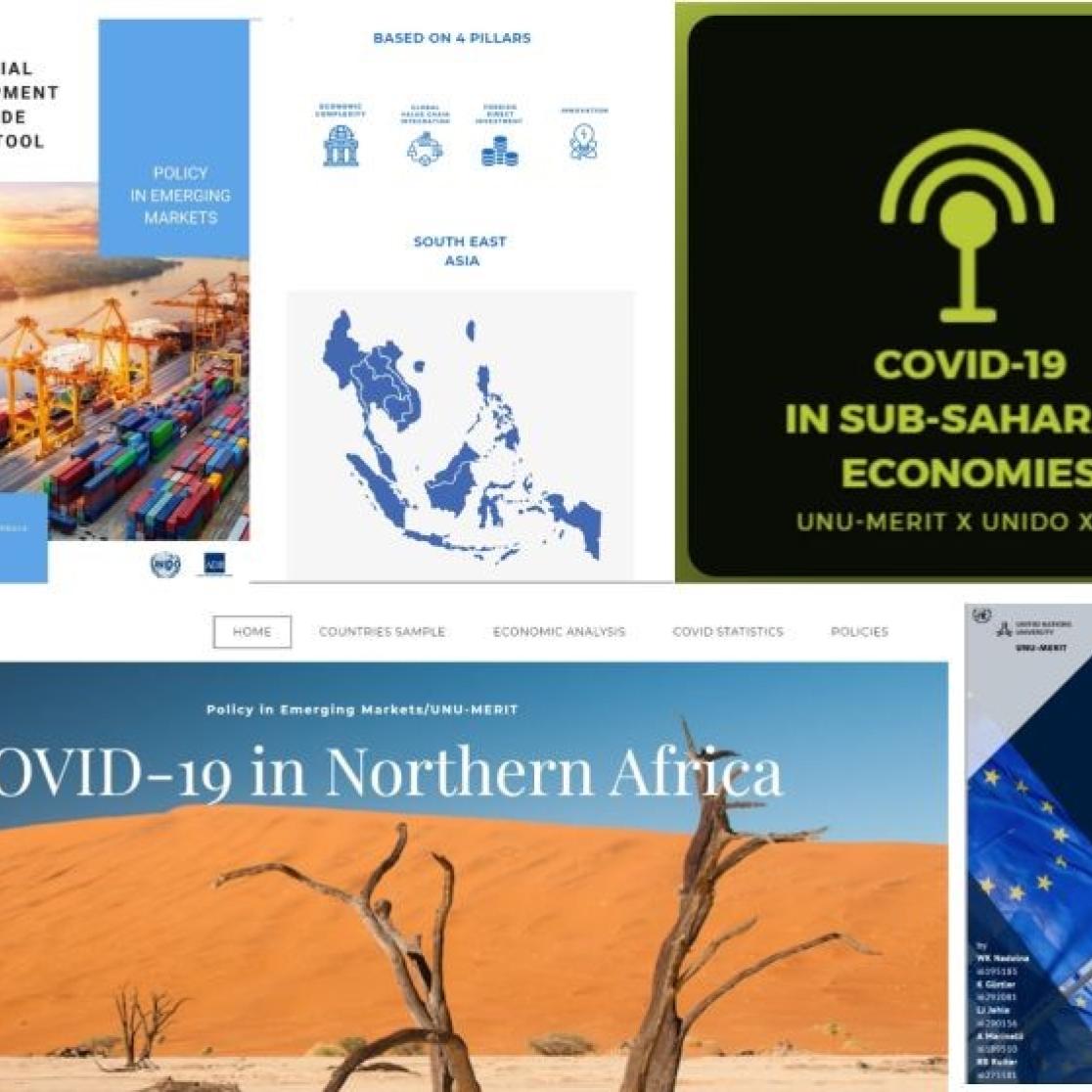Students collaborate with researchers to tackle policy issues across the globe
On 3 December, the students from the Master of Economics and Strategy in Emerging Markets at Maastricht University School of Business and Economics presented the output from their project work on a wide range of topics from the impact of Covid-19 in Northern Africa, South Africa and Zambia to migration in the EU and Industrial policy.
Their project work was in collaboration with researchers from UNU-MERIT, Neil Foster-McGregor and Katrin Marchand, and under the general supervision of Kirsten Haaland. In teams of 5 to 6, the students worked on a wide range of topics from the impact of Covid-19 in Northern Africa, South Africa and Zambia, migration in the EU and Industrial policy. These projects are part of the Policy in Emerging Markets course, which provides an interdisciplinary hands-on experience that enables the students to reflect on and develop solutions to actual policy issues faced by researchers and their real-world clients such as the Asian Development Bank, the United Nations Industrial Development Organization or the German Development Bank (GIZ).

The first two teams worked on a project requested by the United Nations Industrial Development Organization and the African Development Bank, to analyze the impact of the COVID-19 pandemic on African countries. They focused in particular on the role of economic and institutional development in explaining the Governments’ response.
The third project relates to work by UNU-MERIT researchers in collaboration with the German Development Bank (GIZ) about migration impacts.
The last team instead focused on trade and industrial policies in South-East Asia, more precisely a group of 11 countries located in the South part of China: Brunei, Burma (Myanmar), Cambodia, Timor-Leste, Indonesia, Laos, Malaysia, the Philippines, Singapore, Thailand, and Vietnam.

COVID 19 in Zambia & South Africa
In this project, the students provided an analysis of the policy support received by firms in Zambia (a lower-middle-income economy) and South Africa (an upper-middle-income economy) using trade, employment, and macroeconomic indicators on the one hand, and the World Bank enterprise survey on the other hand.
Their results are also summarized in a podcast available on Spotify on the economic impacts of the pandemic in Zambia and South Africa
ESEM Student David Silvertand
"This research provided us with a different scope on a part of the world not often being researched, and I hope our research can show NGOs and local institutions that best intentions regarding COVID-19 help towards SMEs can fill in some demand side gaps."
Triple Win in Labour Migration in the European Union
Recently, a narrative was introduced to discuss the potentiality of a triple win in migration. This would denote a situation in which all three parties, the origin country, the destination country, and the migrant, benefit from the migration. The aim of the students’ report, therefore, aims to answer four main questions:
- What opportunities for international labour mobility exist?
- What effects of labour mobility on countries of origin, countries of destination and migrants have been identified?
- Do different models of labour mobility schemes have different implications, especially for the countries of origin and their labour markets?
- To what extent can the triple win argument be underlined with the identified empirical evidence?
On their website, they provide the dataset they have developed as well as their report.
Password is: esem
Industrial development and trade policy tool
This report aims to help policymakers in their analysis and decision making through the four pillars
- Economic Complexity,
- Global Value Chain,
- Foreign Direct Investments and
- Innovation.
Under each are identified indicators that are used to analyse the regional overview and specific country cases. These indicators can guide policymakers by helping them identify the position of their country in terms of trade composition, economic complexity and where they are currently at in the GVC as well as the value-added generated by the different forms of participation in the GVC. In addition to the report, they have created a manual to guide policymakers.
ESEM Student Caroline Da Silva
"Overall, I hope that our output would be, in a way, useful in carrying out the project’s objectives and that is to provide intuitive indicators for policy makers in developing their respective countries’ industries and in turn help flourish and integrate their local economies into international trade, whether regional or global."
The Master of ESEM is a programme in cooperation with UNU-MERIT
Also read
-
Globalisation & Law Network seminar with Rodrigo Vallejo Garretón
On 4 July 2025, the Globalisation & Law Network had the pleasure of welcoming Dr Rodrigo Vallejo Garretón, Assistant Professor in Private Law at the University of Amsterdam.

-
Language policy in European higher education
The increased Englishization of higher education is under discussion in several European countries. What does a balanced language policy look like that does justice to both the increasingly international character of higher education and a country's language-related cultural identity? At an...

-
A pinch of LSD, taken twice daily with meals
Fast forward to 2040: if you have ADHD or another psychological disorder, the doctor may no longer prescribe Ritalin or antidepressants, but instead a low dose of magic mushrooms, truffles or LSD. Associate professor Kim Kuypers is studying the use of psychedelics as potential medicines of the...
